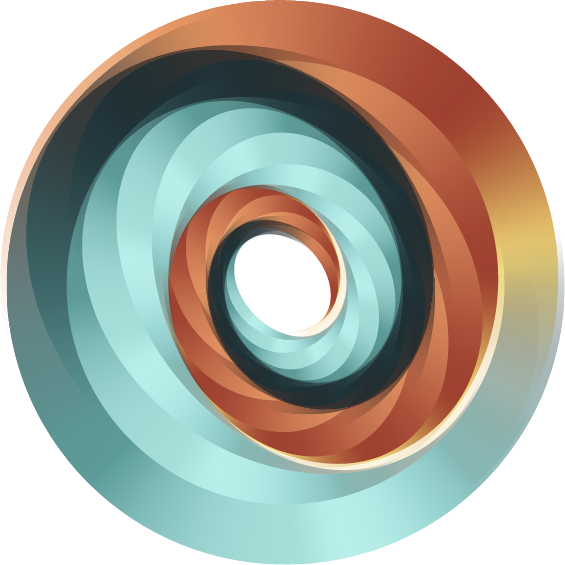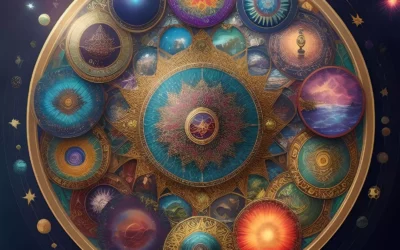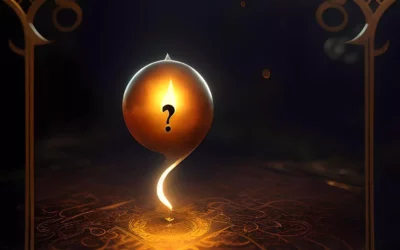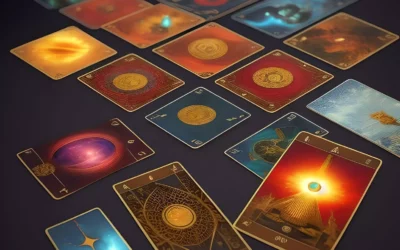Growing up I have had my fair share of experiences with Tarot card readings. Whether it’s for entertainment or personal insight, Tarot cards have been a popular form of divination for centuries. However, one question that often arises is whether Tarot cards can be wrong.
While Tarot cards can provide valuable insights and guidance, they are not infallible. Like any divination tool, the accuracy of a Tarot card reading depends on various factors, such as the reader’s interpretation, the individual’s energy, and the fluidity of time. In this article, we will explore the factors that contribute to the accuracy of Tarot card readings and debunk common misconceptions about Tarot cards.
Key Takeaways:
- Tarot cards can provide valuable insights, but they are not infallible.
- The accuracy of a Tarot card reading depends on various factors, such as the reader’s interpretation and the individual’s energy.
- Common misconceptions about Tarot cards will be debunked in this article.
Debunking Tarot Myths
When researching Tarot readings as I was working on the Temple of the Great Oracle, I often encountered misconceptions and myths surrounding the practice. These false beliefs can prevent individuals from experiencing the benefits of Tarot card readings. In this section, I aim to clarify and debunk some of the most common Tarot card reading misconceptions.
Debunking Tarot Myths
-
- Myth: Tarot cards have the power to predict the future with 100% accuracy.
This is perhaps the most pervasive myth surrounding Tarot cards. While Tarot cards can provide guidance and insights into future possibilities, they do not have the power to predict the future with complete accuracy. The future is fluid and ever-changing, influenced by a multitude of factors that are beyond the scope of a single Tarot card reading.
-
- Myth: Tarot card readings are a form of witchcraft or black magic.
This is a common misconception that stems from a lack of understanding of what Tarot card readings actually entail. Tarot card readings are a divination tool that can provide clarity and guidance in various aspects of life. They are not associated with any particular religion or belief system, nor do they involve any form of witchcraft or black magic.
By debunking these myths, I hope to encourage individuals who may have been hesitant to explore Tarot card readings to approach the practice with an open and informed perspective.
Understanding Tarot Card Meanings
As I mentioned earlier, one of the key aspects of accurate Tarot card interpretation is understanding the meanings behind each card. This can be a daunting task, especially for beginners, as each card has multiple layers of symbolism and can be interpreted in a variety of ways.
However, it’s important to remember that Tarot cards are not meant to be interpreted in isolation. Rather, they are part of a larger system that includes the reader’s intuition, personal experience, and the querent’s (the person receiving the reading) unique situation.
To begin the process of understanding Tarot card meanings, I recommend starting with the traditional interpretations. These are based on centuries of collective wisdom and provide a solid foundation for interpretation. From there, you can begin to explore additional layers of meaning and symbolism based on your own intuition and personal experiences.
It’s also important to keep in mind that while Tarot cards have general meanings, they can also be influenced by their placement within a spread. For example, a card that typically represents abundance and prosperity may take on a different meaning if it appears in a position related to conflicts or obstacles.
Ultimately, accurate Tarot interpretation is a nuanced and ever-evolving practice that requires both knowledge and intuition. By understanding the traditional meanings of each card and remaining open to your own interpretation, you can begin to unlock the deeper insights that Tarot cards can provide.
Factors Contributing to Inaccurate Readings
It’s important to recognize the various factors that can contribute to inaccurate readings. One common mistake is relying too heavily on personal biases and interpretations. It can be tempting to see what we want to see in the cards, rather than what they are trying to tell us.
Another potential pitfall is a lack of understanding of the Tarot card meanings. Each card has its own unique symbolism and interpretation, and misinterpreting them can drastically alter the accuracy of a reading.
Additionally, outside influences such as distractions, disruptions, or even the reader’s own emotional state can impact the outcome of a reading. It’s crucial to approach each reading with a clear and focused mind.
Factors to Consider:
| Common Tarot Card Mistakes | How to Avoid Them |
|---|---|
| Relying too heavily on personal biases and interpretations | Approach each reading with an open mind and without preconceived notions |
| Lack of understanding of Tarot card meanings | Study and memorize the meanings of each card, and seek guidance from experienced readers or resources |
| Outside influences such as distractions or emotional states | Find a quiet and peaceful environment to conduct readings, and take steps to calm and center oneself before beginning |
By being aware of these potential pitfalls and taking steps to avoid them, Tarot card readers can increase the accuracy and effectiveness of their readings. However, it’s important to remember that no reading is ever 100% accurate, as the future is not set in stone and subject to change based on individual choices and actions.
Developing Intuition and Connection
Developing intuition and establishing a connection with the cards is crucial for accurate interpretation when it comes to Tarot card readings. While understanding the traditional meanings of each card is essential, intuition allows us to tap into our inner wisdom and receive guidance beyond the surface-level explanations.
Connecting with the Tarot cards can take time and practice. One helpful exercise is meditation with the cards, allowing us to build a relationship with each card and its unique energy. It’s important to approach the cards with respect and an open mind, allowing their messages to come through without judgment or preconceived notions.
Intuition and connection can also be enhanced by paying attention to our own emotions and sensations during a reading. As we become more attuned to the energy of the cards, we may notice physical sensations like tingling or warmth, or emotions like excitement or unease. Trusting these intuitive cues can lead to deeper insights and a more accurate interpretation.
Ultimately, developing intuition and connection with the Tarot cards is both a personal and ongoing journey. By approaching readings with open-mindedness and a willingness to learn, we can tap into the powerful insights the cards have to offer.
Ethical Considerations in Tarot Readings
I believe conducting readings with integrity and respect for the client is paramount, and this is why I have poured my energy into building a just and fair algorithm that will work on your tarot readings. It is essential to approach every reading with an open mind and without any preconceived notions or biases.
One of the most important ethical considerations is ensuring that the client is fully informed about the reading process and what to expect. This means discussing the purpose of the reading, the types of questions that can be asked, and the potential outcomes. Clients should also be informed of their right to stop the reading at any time if they feel uncomfortable or uneasy.
Another ethical consideration is confidentiality. As a reader, I always make sure to keep the information shared during a reading private and confidential. I do not disclose any details of the reading to anyone unless I have the express permission of the client.
It is also important to avoid making any promises or guarantees about the accuracy of the reading. As much as I strive to provide accurate and insightful readings, it is important to remember that Tarot cards are not infallible and cannot predict the future with 100% accuracy.
Finally, it is essential to avoid exploiting the vulnerabilities of the client. This means refraining from making any overly negative or frightening predictions that may cause unnecessary distress or anxiety. As much as possible, it is important to provide guidance and support in a compassionate and positive manner.
Seeking Professional Guidance
As someone who has had many Tarot readings for years, I cannot stress enough the importance of seeking professional guidance when it comes to accurate readings. While self-interpretation can be a valuable tool for personal growth and reflection, it is not always the most reliable option.
Professional readers have years of experience and training in understanding Tarot card meanings and interpreting them accurately. They are also well-versed in the ethical considerations of conducting readings and can provide valuable insights and guidance beyond what a beginner may be able to glean from the cards.
Additionally, seeking professional guidance can help prevent inaccurate readings and the potential consequences that may come with them. A misinterpreted reading can lead to confusion, anxiety, and unnecessary decision-making based on false information.
So, if you’re serious about getting accurate and insightful Tarot readings, I highly recommend seeking the guidance of a professional reader. It can make all the difference in the quality of your experience and the accuracy of the information you receive.
Personal Responsibility and Free Will
One important factor to keep in mind when approaching a Tarot card reading is the role of personal responsibility and free will. While the cards may provide insights and guidance, ultimately it is up to the individual to make their own choices and take responsibility for their actions.
As a Tarot reader, I always stress the importance of approaching readings with a sense of personal agency. The cards may indicate potential outcomes, but it is up to the individual to make decisions that align with their goals and values.
It is also important to keep in mind that the future is not set in stone. Every choice and action we take has the potential to influence the trajectory of our lives. Tarot card readings should be viewed as tools for guidance and reflection rather than absolute predictions.
When receiving a reading, it is important to approach it with an open mind and a critical eye. Take the insights provided by the cards into consideration, but ultimately trust your own intuition and judgment.
Honoring the Fluidity of Time
In Tarot card readings, time is a concept that can greatly affect the accuracy of predictions. As I mentioned earlier, the future is not set in stone and can be influenced by individual choices and actions. This means that while a Tarot card reading can provide insights into potential outcomes, it should not be viewed as an absolute truth.
It’s important to remember that time is always in flux and that even the smallest decision can alter the course of our lives. In Tarot readings, this means that predictions should be approached with a flexible and open-minded perspective. Rather than placing all our hopes and expectations on a single outcome, we should embrace the guidance provided by the cards and use it as a tool for personal growth and development.
Embracing Interpretation as an Art
Interpreting Tarot cards is not just a matter of memorizing meanings and applying them to specific situations. It is also an art that requires us to tap into our intuition and creativity.
When I first started reading Tarot cards, I struggled to find a balance between sticking strictly to traditional interpretations and allowing myself to explore alternative meanings. However, over time, I realized that the beauty of Tarot lies in its fluidity and the room it allows for personal interpretation.
Embracing interpretation as an art means developing a deep understanding of the symbolism and archetypes represented by each card, while also trusting our inner voice to guide us towards the most accurate interpretation for a given situation. This requires us to be open-minded and willing to explore different perspectives.
One way to hone our interpretive skills is to practice reading Tarot for ourselves and others regularly. The more we work with the cards, the more comfortable we become with their energy and meanings, and the easier it becomes to trust our intuition when interpreting them.
At the same time, it’s important to remember that interpretation is not an exact science, and that there is always room for error. We should approach Tarot readings with a sense of humility, recognizing that our interpretations are only one piece of a much larger puzzle.
Ultimately, embracing interpretation as an art allows us to unlock the full potential of Tarot cards as a tool for self-discovery, growth, and guidance. With practice and an open mind, we can develop our interpretive skills and use them to help ourselves and others navigate life’s challenges.
Conclusion
In conclusion, Tarot cards can provide valuable insights and guidance when approached with an open mind and a discerning perspective. However, like any divination tool, they are not infallible and can be subject to inaccuracies. It is important to understand the meanings behind the cards and to develop intuition and connection with them to enhance the accuracy of readings. It is also crucial to conduct readings with integrity and seek professional guidance when necessary.
Personal responsibility and free will play an important role in Tarot card readings, as individual choices and actions can influence the accuracy of predictions. It is also important to honor the fluidity of time and view predictions as guidance rather than absolute outcomes.
At the end of the day, Tarot card interpretation is an art that requires a balance between tradition and individual interpretation. By embracing this balance and approaching Tarot card readings with an open mind, anyone can gain valuable insights and guidance from this ancient divination tool.
FAQ
Q: Can Tarot Cards Be Wrong?
A: While Tarot cards can provide valuable insights and guidance, it’s important to remember that they are not infallible. The interpretation of Tarot cards relies on the reader’s intuition and understanding, which can vary. Additionally, individual choices and actions can influence the outcomes predicted by the cards. Therefore, it’s essential to approach Tarot readings with an open mind and a discerning perspective.
Q: Debunking Tarot Myths
A: There are many misconceptions surrounding Tarot card readings. Some believe that Tarot cards have the power to predict the future with absolute certainty, while others see them as inherently evil or manipulative. However, these beliefs are not accurate. Tarot cards are simply a tool for self-reflection and guidance, and their accuracy depends on the reader’s interpretation and the individual’s openness to receiving insights.
Q: Understanding Tarot Card Meanings
A: Interpreting Tarot card meanings accurately is crucial for a comprehensive reading. Each card holds its own symbolism and significance, which can vary depending on the context and the surrounding cards. Familiarizing oneself with the traditional meanings and learning to trust one’s intuition are key elements in understanding Tarot card meanings and achieving accurate interpretations.
Q: Factors Contributing to Inaccurate Readings
A: Inaccurate Tarot card readings can occur due to various factors. Common mistakes made by readers, such as personal biases or misinterpretation of symbols, can affect the accuracy of the reading. Additionally, external influences, such as distractions or the energy of the environment, can also impact the reading. It’s important for readers to be aware of these potential pitfalls and take steps to minimize their influence.
Q: Developing Intuition and Connection
A: Developing intuition and establishing a strong connection with the Tarot cards can greatly enhance the accuracy of readings. Intuition allows the reader to tap into their subconscious knowledge and receive insights beyond the literal meanings of the cards. Building a connection with the cards involves spending time with them, meditating on their symbolism, and listening to one’s inner voice during readings.
Q: Ethical Considerations in Tarot Readings
A: Conducting Tarot card readings ethically is essential for maintaining integrity and ensuring accurate interpretations. Readers must prioritize the well-being and autonomy of the individuals seeking guidance. This includes obtaining consent, offering objective insights, and refraining from making absolute predictions that may interfere with personal free will. Upholding ethical standards helps foster trust and respect in the practice of Tarot card readings.
Q: Seeking Professional Guidance
A: Seeking professional guidance from experienced Tarot card readers can be beneficial for obtaining accurate readings. Professional readers have honed their skills through extensive knowledge, practice, and experience. They can provide valuable insights, offer objective perspectives, and guide individuals through their Tarot card journeys. However, it’s important to remember that even professionals can have different interpretations, and personal intuition should be considered alongside their guidance.
Q: Personal Responsibility and Free Will
A: Personal responsibility and free will play important roles in Tarot card readings. While Tarot cards can offer guidance and potential outcomes, it’s ultimately up to the individual to make choices and take actions. Personal free will allows individuals to shape their own paths and influence the accuracy of predictions. Tarot card readings should be viewed as tools for self-reflection and empowerment, rather than as absolute determinants of fate.
Q: Honoring the Fluidity of Time
A: Tarot card readings should be approached with an understanding of the fluidity of time. Predictions are not set in stone but rather offer potential outcomes based on current energies and circumstances. Time is constantly changing, and individual choices can alter the predicted course of events. It’s important to view Tarot card readings as guidance and use them to inform decisions rather than relying solely on them for absolute certainty.
Q: Embracing Interpretation as an Art
A: Interpretation is a fundamental aspect of Tarot card readings. While there are traditional meanings associated with each card, interpretation is also subjective and open to individual intuition. Embracing interpretation as an art allows readers to tap into their creativity and unique perspectives, while still respecting the core symbolism of the cards. Balancing intuition with a solid understanding of traditional meanings can lead to accurate and insightful Tarot card readings.




